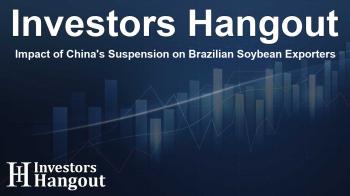Impact of China's Suspension on Brazilian Soybean Exporters

China's Decision to Halt Soybean Imports
Recently, China, recognized as the largest global buyer of soybeans, made a significant decision to stop accepting shipments from five Brazilian firms. This action stems from the firm's failure to comply with essential phytosanitary standards, as reported by reliable sources.
Brazil's Position in the Soybean Market
Brazil stands out as the leading exporter of oilseeds worldwide. However, this recent suspension has raised alarms, particularly for firms such as Terra Roxa Comercio de Cereais, Olam Brasil, and C.Vale Cooperativa Agroindustrial, which experienced halted shipments effective from early January. This cessation of exports could create substantial disruptions in the market.
Details of the Suspension
The suspensions set forth were primarily due to concerns regarding certain shipments that were alleged to have been tainted with contaminants, possibly including chemicals, pests, or insects. Although the specifics of these contaminants remain undisclosed, the implications for Brazilian soybean exporters could be severe. This situation underscores the critical importance of maintaining high standards in agricultural exports to sustain international trade relations.
Concerns Over Future Trade
With the potential backlog of shipments building up, both Brazil and China are faced with uncertain futures in their trade partnership. Reports suggest that these phytosanitary challenges could lead to more stringent regulations and inspections in future shipments. As Brazil works to regain its stature in the soybean market, addressing these issues promptly will be essential.
Market Reactions and Economic Implications
The immediate reaction from the market has highlighted the vulnerabilities in Brazil's agricultural export sector. Exporters are now pushing for a clearer understanding of the guidelines needed to avoid similar suspensions in the future. The economic implications of such trade barriers can be profound, affecting not only the involved companies but also the broader Brazilian economy which heavily relies on agricultural exports.
The Path Forward for Brazilian Exporters
To navigate this challenging landscape, Brazilian exporters must enhance their quality control measures and ensure compliance with international standards. Strengthening relationships with Chinese importers will also play a critical role as they work towards rebuilding trust and securing a stable footing in the competitive global market.
Frequently Asked Questions
1. Why did China halt soybean imports from Brazilian firms?
China ceased imports due to concerns over various shipments failing to meet phytosanitary standards.
2. Which Brazilian companies were affected by the suspension?
The affected firms include Terra Roxa Comercio de Cereais, Olam Brasil, C.Vale Cooperativa Agroindustrial, Cargill Agricola S A, and ADM do Brasil.
3. What were the contaminants found in the shipments?
The specifics regarding the contaminants have not been detailed, but they included possible chemicals, pests, or insects.
4. How could this suspension impact Brazilian soy exports?
The suspension may lead to significant disruptions and could hinder Brazil's position in the global soybean market.
5. What steps can Brazilian exporters take to prevent future suspensions?
Exporters could enhance their quality control processes and ensure they adhere to international standards to avoid future issues.
About Investors Hangout
Investors Hangout is a leading online stock forum for financial discussion and learning, offering a wide range of free tools and resources. It draws in traders of all levels, who exchange market knowledge, investigate trading tactics, and keep an eye on industry developments in real time. Featuring financial articles, stock message boards, quotes, charts, company profiles, and live news updates. Through cooperative learning and a wealth of informational resources, it helps users from novices creating their first portfolios to experts honing their techniques. Join Investors Hangout today: https://investorshangout.com/
Disclaimer: The content of this article is solely for general informational purposes only; it does not represent legal, financial, or investment advice. Investors Hangout does not offer financial advice; the author is not a licensed financial advisor. Consult a qualified advisor before making any financial or investment decisions based on this article. The author's interpretation of publicly available data presented here; as a result, they should not be taken as advice to purchase, sell, or hold any securities mentioned or any other investments. If any of the material offered here is inaccurate, please contact us for corrections.
